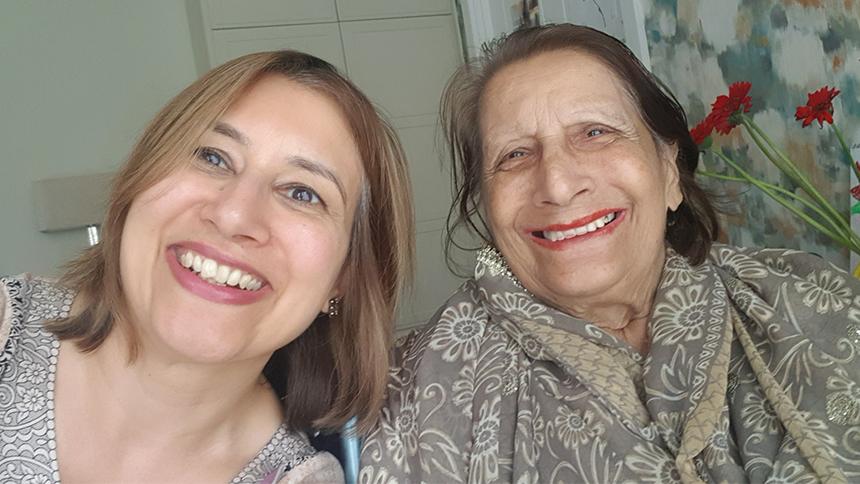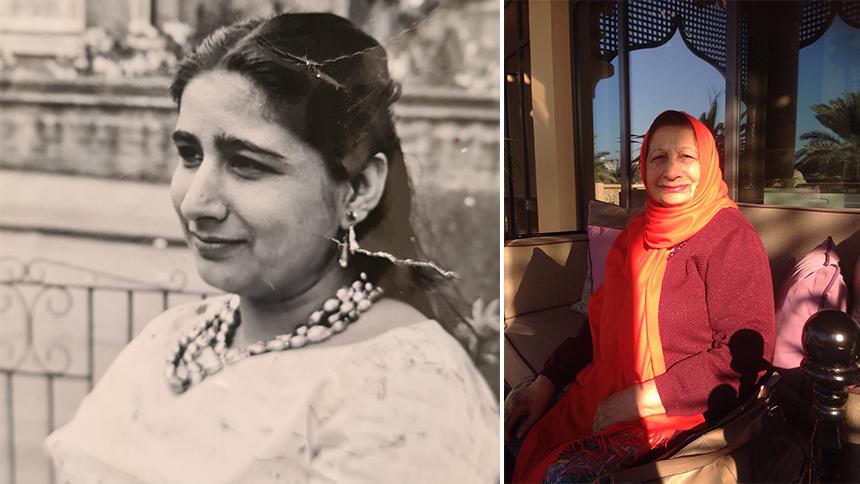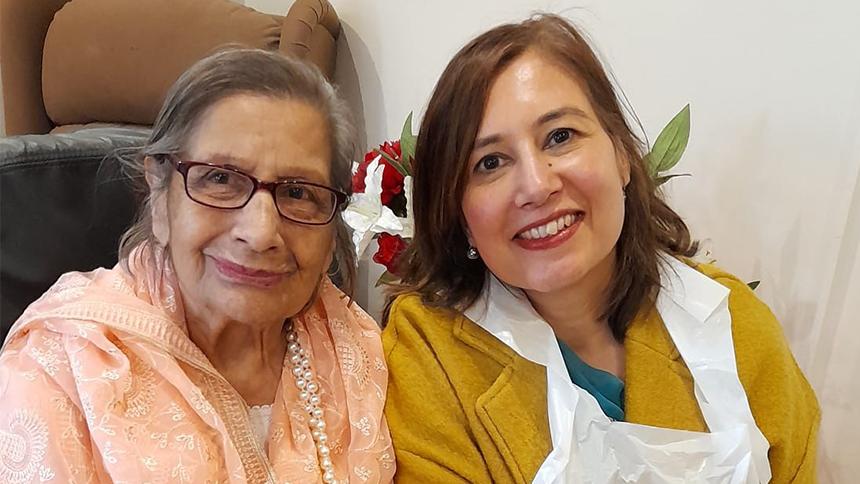
Nabila wants better dementia care following her mother’s experiences
Nabila Zulfiqar’s late mother had many appalling hospital and care home experiences.
If you saw her walking along the street, you might think she was a typical housewife of her time, carrying her shopping, cooking for her family and caring for her home.
But to those who knew her, Nighat Bano Zulfiqar – known as Bano – was, quite simply, a treasure.
‘She was devoted to her children, as you would expect,’ says Nabila, one of her daughters, ‘But she was interested in everyone she spoke to, regardless of their age or background.
‘She didn’t judge anyone. She just loved talking to people.’
Nabila remembers Bano as full of energy, positive and kind, and always wanting to socialise. If her mastery of English held her back, her smile won you over.

Chain of events
Bano had come to the UK from Pakistan in the late 1960s and settled in Birmingham. She was separated from her husband and, once Nabila’s sisters and brother had left, the two women happily shared the family home.
Nabila noticed her mum was becoming forgetful and put this down to age. However, she was concerned that osteoarthritis in Bano’s knee made her less mobile and more afraid of falling.
‘Winters were the worst, causing pain she didn’t complain about,’ says Nabila. ‘Once I went upstairs and found she’d fallen and was trying to get up without asking for help.’
A consultant recommended knee replacement surgery. The operation failed and was followed by a chain of distressing experiences that her family often felt powerless to influence.
A diagnosis of Alzheimer’s, more ill health and more surgery left Bano unable to return to the home she loved.
Valuing care
Since her mother died just over a year ago, Nabila has used her experience to help others.
As well as establishing a carers support network at her workplace, she’s also a strong advocate for care workers to be valued in society.
‘We must see them as professionals,’ she explains.
‘If we don’t have good quality care workers – these people are invading your privacy on a daily basis, combing your hair, brushing your teeth, taking you to the toilet and we’re paying them the minimum wage to do this – what does that say about how much we value them or ourselves?’
Nabila had never thought her mother would live in a care home and, when there was no choice, finding one was a nightmare. Some said they could not cater for Bano’s needs or that her dementia wasn’t bad enough.
On top of this, while Nabila is legally qualified, she battled to understand the complexities of self-funding. Requests for payment of thousands of pounds came out of the blue from their local council.
These were addressed to Bano, who struggled with written English in addition to coping with Alzheimer’s. The letters said the council wanted to ‘put a charge’ on her property to ensure it would get back the money it was contributing towards Bano’s care.
They fought the council’s decision but ultimately their home needed to be sold.
Shocks and disappointments
Eventually they found a care home that could meet Bano’s dietary needs as a Muslim – a great relief to the family. Sometimes Punjabi staff, who she could communicate with, worked there.
Bano began to feel at home until, after six months, the management changed and suddenly announced they were no longer dementia specialists. To everyone’s great shock, she had to leave.
At her second home, sparkling new and furnished with chandeliers, the level of competency was poor.
Bano still enjoyed communicating with people, while other residents couldn’t. Despite this, the staff treated everyone as if dementia affected them in the same way.
Nabila says, ‘Her English wasn’t always strong, but if people spent time with her, she could understand.’
Time was what was missing. It was here Bano fractured her arm and experienced dehydration, leading to more hospital visits.
‘The home didn’t understand that Bano needed her prayer book. In future, there will be more people from different backgrounds who’ll need care. Care homes need to know the importance of meeting individual needs.’
The establishment was placed in special measures and senior staff were sacked.
Her third care home was run by a Jewish charity and was the most effective, responsive and caring. Here she felt part of the family.
Nabila says, ‘In all these homes, Mum’s monthly cost was more than £5,000, but it’s shocking how variable the quality of care is.
‘Mum’s consultant said she needed daily mental stimulation, tailored towards her needs. Care homes say on their websites, “We’ll do a personal care plan, we’ll tailor our care,” but they don’t have the staff to do that.
‘Before you accept a place, do the questioning, challenging and asking. Speak to other relatives who are there.
‘Pop in at different times, such as the evenings, to see what’s going on. Ask yourself if this is somewhere you would want to live.’
Hospital distress
The care home stays were surrounded by difficult times in hospitals.
Looking back, Nabila wishes she had intervened more when decisions were made, though some events were out of her control.
When Bano’s knee operation went wrong – the metal implant was visible because the skin hadn’t healed – this led to more and more surgery. With each operation, her memory seemed to decline.
Often, Bano wasn’t cared for properly. At one stage she fell out of her hospital trolley, fracturing her thigh. She caught infections. Another time, she was discharged covered with rashes and a grade three pressure sore. Towards the end, she contracted pneumonia.
Now, Nabila wonders if the family had too much faith in the medical staff, especially when Bano could only communicate in a limited way.

Wanting to believe
Even though Bano died at 77, more than a year ago, Nabila’s battles continue.
She wants apologies from the hospitals she feels let her mother down. She wants to believe they learnt from what went wrong. She believes in-patients with dementia are not properly understood.
She’s pushing a message that when people have dementia, they are less able to communicate for themselves, which means hospitals need more training on how to help – anything else is neglect.
‘At one time, Mum was in a room by herself. She had to be isolated at the time, but she didn’t remember why and was afraid she would be forgotten. She needed reassurance that no one would forget her.
‘If she said she didn’t want a bed wash, they left her. If she didn’t want to eat, they took her food away. That’s just appalling.’
Through Alzheimer’s Society, Nabila made written representations to the Parliamentary Joint Committee on Human Rights about people in care.
‘You trust the staff in care homes. You put your faith in them. I’m passionate about raising awareness about recruitment and retention of care workers, and the professionalism of social care staff. Until that’s sorted, you’ll always have problems.
‘They are not regulated or supervised. Their training and skills may or may not be developed. They’re expected to do 12 hour shifts – who could be physically and mentally fit for this?'
‘The system is broken but I found if we challenged them too much, they would give us notice.’

Lasting impression
Nabila misses her mum terribly.
‘I know it was probably the right time for her to go. It would have been hard if she couldn’t recognise us and that was going to happen, but even though she had pneumonia, she fought for her life to the end.’
She thinks back to how much is involved in caring for a relative – managing every side of their life, their care, their home, their medication, hospital stays and visits.
‘It’s so much work,’ she says.
She doesn’t begrudge a moment. Every day Nabila thinks about Bano.
‘Her smile is the thing that won people around. When she left hospital, 12 nurses came to say goodbye. One was in tears.'
‘She’d been there for months at a time, so the nurses knew and loved her. Everywhere she went, she made an impression.’
Campaign for better care
Join our calls for a health and social care system that guarantees quality care and support.


Gillian Hall
saysSalina
saysSandra Heard
sayslisa
saysShahz Jaweed
saysRehana Findlay
says